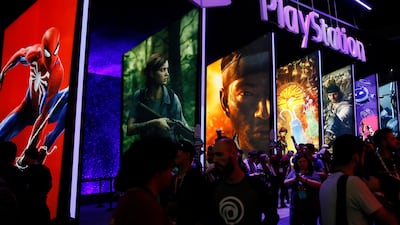Sony is purchasing Bungie, the US video game developer behind the popular Destiny and Halo franchises, for $3.6 billion to bolster its stable of game-making studios.
The deal announced on Monday by Sony Interactive Entertainment is the third significant video-game acquisition this month, following Microsoft's purchase of Activision Blizzard for $69bn two weeks ago and Take Two Interactive snagging mobile game leader Zynga on January 10.
Buying Bungie will give Sony one of the most popular first-person shooter games to compete with the massive Call of Duty series, which Sony’s main rival now owns through Activision.
Sony shares were up as much as 2.6 per cent in Tokyo in Tuesday morning trading.
Microsoft is committed to releasing at least the next three Call of Duty games on Sony’s PlayStation, Bloomberg News reported. But eventually, Microsoft could decide to take the series exclusively to its Xbox console and Windows computers.
Sony, meanwhile, made clear that Destiny 2 and other titles won’t go solely to PlayStation platforms.
“This acquisition will give SIE access to Bungie’s world-class approach to live game services and technology expertise, furthering SIE’s vision to reach billions of players,” Sony said in the statement.
Bungie will continue to operate independently, “maintaining the ability to self-publish and reach players wherever they choose to play”.
Sony is a regular acquirer of video game studios, though Bungie is by far its largest of the past decade. The Japanese entertainment and technology company typically buys less established studios and enhances them with marketing and development resources, as it did for Naughty Dog and Guerrilla Games.
Sony also holds minority stakes in some bigger game companies, such as Epic Games, the maker of Fortnite. In recent years, Sony has made some smaller acquisitions, notably Burbank, California-based Insomniac Games in 2019 and Finland’s Housemarque, aiming to bolster its library of PlayStation exclusives.
While Microsoft has focused on packing its subscription service, Xbox Game Pass, full of games big and small, Sony’s blueprint is to develop large blockbusters and keep them exclusive to PlayStation – a strategy that helped the PlayStation 4 sell more than 116 million units, well ahead of the Xbox.
“We have entered a major arms race for game content as streaming looks to dramatically change the business model of gaming and we think this is a contest that Sony simply cannot win given its limited financial resources,” Amir Anvarzadeh of Asymmetric Advisors said after the announcement.
“We also have little doubt now that Sony is about to launch its own full-on streaming service to fight off Microsoft’s Game Pass, which has been reportedly losing money. All this strongly supports the view that for Sony, the PS5 era should prove far less profitable than the previous generation.”

Founded in 1991, Bungie helped put the Xbox on the map. Microsoft paid about $30 million to acquire the studio when it was mostly a Mac game developer working on a computer-gaming project called Halo. The game became the foundation for Microsoft’s Xbox consoles and generated more than $6bn in sales, not including the most recent installment, which became available last holiday season.
In 2007, Bungie negotiated its independence and spun out from Microsoft to work on its next big thing, Destiny, with Activision. That relationship ended in 2019 and Bungie began self-publishing and operating Destiny independently. Based in Bellevue, Washington, Bungie has more than 900 employees.
Destiny functions differently than many other franchises. Rather than release a regular cadence of sequels, Bungie decided to continue operating and expanding the most recent game, Destiny 2.
The base game is free-to-play, while Bungie regularly releases expansions and season passes full of new content. The move has been popular, drawing in more than 20 million players since 2019, according to Bungie.
After the deal closes, Bungie will be an independent subsidiary of Sony Interactive Entertainment, run by Bungie’s current chief executive Pete Parsons.
The transaction price includes employee incentives and is subject to customary working capital and other adjustments, Sony said.

